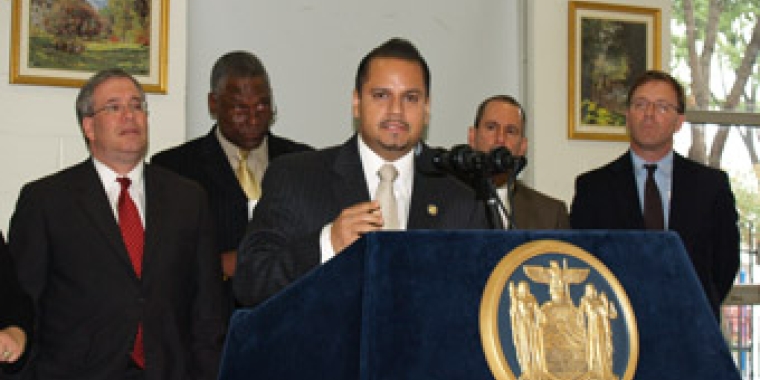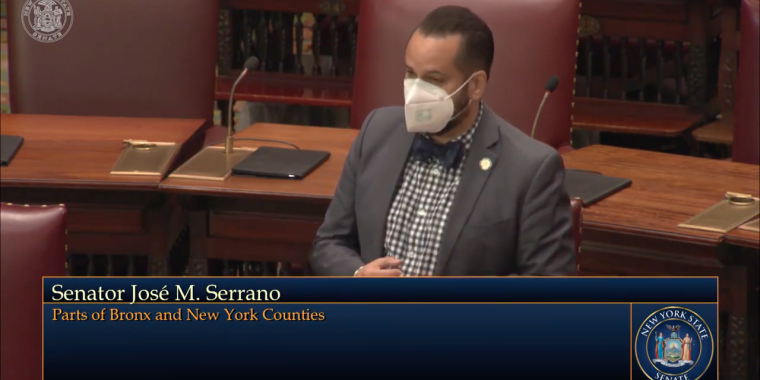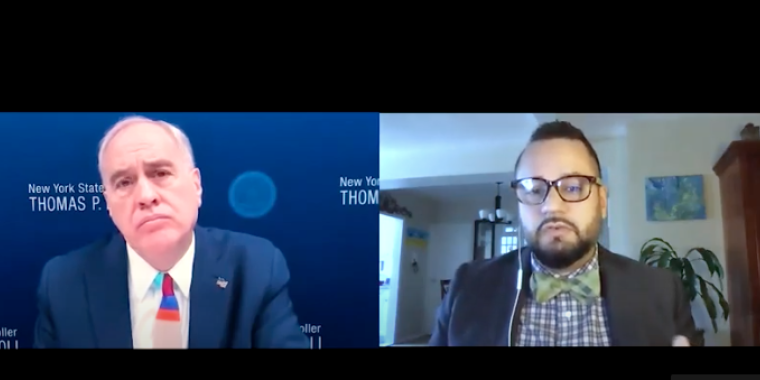
Senator Serrano Joins Governor Paterson To Announce $170 Million In New Funding For Food Stamp Program

Senator Serrano Joins Governor Paterson to Announce $170 Million in New Federal Funding for New York's Food Stamp Program
Passage of Federal Farm Bill and Adjustments to HEAP Will Provide Increased Benefits for New York's Neediest Households
Additional $1 Million Provided to Food Banks Across New York
Governor David A. Paterson came to the 28th Senate District on Thursday afternoon to announce additional food support for working class New Yorkers. He was joined by Senator Serrano, local elected officials, community leaders and residents at the Stanley M. Isaacs Neighborhood Center.
"In my district, a severe lack of nutritious and affordable food has led to high rates of preventable disease," said Senator Serrano. "Earlier this year I developed a Task Force that has mapped out supermarket closures and worked to develop comprehensive steps to improve public health."
He continued, "None of this is possible without purchasing power. So many of my constituents moving up the socio-economic ladder rely on food stamps to help feed their families. I applaud Governor Paterson for marshalling the full force of the State government to bring the freedom of food back to where we need it the most: in the working class neighborhoods of our city."
Under the leadership of Governor Paterson, New York State has implemented changes to the Home Energy Assistance Program (HEAP) that will result in an increase of $150 million in Federal Food Stamp benefits for low-and moderate-income families.
Additionally, the passage of this year's federal Farm Bill provided an extra $20 million to New York's Food Stamp program for next year. In total, changes to New York's Food Stamp program have resulted in more than $170 million in federal funds next year for our State's neediest families, with increases in future years. Governor Paterson also announced $1 million in funding for food banks across the State to provide further assistance for low-income New Yorkers.
"During these difficult economic times we must do what we can to ensure that New York's families have the resources they need to feed their families," said Governor Paterson. "The changes the State has implemented will not only benefit New York's most vulnerable populations, but will infuse hundreds of millions of new federal dollars into our State's economy at a time when we need it most."
Also present at the event were U.S. Congressman Charlie Rangel, New York City Human Resources Administration (HRA) Commissioner Robert Doar, Manhattan Borough President Scott Stringer, State Senator Liz Krueger, Assemblyman Keith Wright, Assemblyman Jonathan Bing and Dr. Lucy Cabrera, President and CEO of the Food Bank of New York City.
The New York State Office of Temporary and Disability Assistance (OTDA) is responsible for oversight of the Food Stamp program and HEAP in New York State, while the administration of both programs is handled locally. The Human Resources Administration administers the HEAP and Food Stamp programs for the five boroughs of New York City.
Additional changes authorized by the Federal Farm Bill that OTDA will implement at the earliest possible time include:
- An increase in the minimum monthly benefit from $10 to $14;
- Elimination of a cap on the amount of out-of-pocket dependent care (principally child care) costs that can be allowed as an income deduction in the calculation of benefits, a move expected to increase benefits to nearly 11,000 households;
- The permanent exclusion of combat pay in the calculation of benefits;
- The exclusion of tax preferred retirement accounts such as Keogh Plans, Individual Retirement Accounts (IRAs), Simplified Employer Plans, Profit Sharing Plans and Cash Balance Plans from countable resources for any households still subject to resource limits (New York State eliminated resource limits for virtually all Food Stamp households as of January 1, 2008); and
- The exclusion of tax preferred educational accounts, such as 529s and Coverdell education savings accounts, from countable resources for any households subject to resource limits.
In addition to the thousands of New York families that will benefit from the Farm Bill changes, the primary beneficiaries of the HEAP program change are low-income families living in public and Section 8 housing, including housing operated by the New York City Housing Authority (NYCHA).



